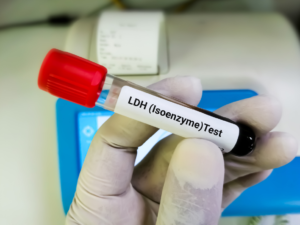We always insist that early diagnosis and knowledge of one’s own body can help to detect illnesses that, if not treated in time, can lead to something worse. We may be able to detect that something is wrong with our body, but we may not know exactly what is wrong. Many diseases have very similar or even the same symptoms, so self-diagnosis is never recommended. In order to inform about specific problems and give you a little guidance about them, today we will talk about cardiolipin antibodies, their symptoms and how to perform a test to find out if everything related to them is in order.
What are cardiolipins?
Cardiolipin is a phospholipid (a type of fat) that we can find in the outermost part of the membranes of cells and blood platelets. The antibodies they produce are usually elevated in people with abnormal blood clotting, with autoimmune diseases (lupus), or in cases of repeated miscarriages. Thus, they can affect an organism’s ability to regulate the blood clotting process. The cause of this abnormal functioning is unknown.
It is true that an individual’s immune system can produce one or more antibodies when it does not know how to differentiate between its own and foreign proteins, but the case of cardiolipin antibodies is different. These antibodies are autoantibodies, which means that they are ‘misprogrammed’ and abnormally attack the body’s own cardiolipins.
The effects of these abnormal attacks on an organism can be serious; it increases the risk of inappropriate and recurrent formation of blood clots (thrombi) in veins and arteries. These antibodies are also associated with a decrease in the number of platelets (thrombocytopenia).
Cardiolipins are the most common antiphospholipid antibodies. This group is usually detected together with other antiphospholipid antibodies, such as lupus anticoagulant and anti-beta 2 glycoprotein I. They can also be observed transiently in some acute infections, such as HIV and AIDS, in some cancers, when taking certain drugs (phenytoin, penicillin and procainamide) and even in healthy elderly people.
What is it for?
Therefore, the determination of cardiolipin antibodies is often requested to investigate the cause of:
- Unexplained blood clot formation.
- Recurrent miscarriages.
- Prolongation of the partial thromboplastin time (PTT) (in this case a test with lupus anticoagulant is usually also requested).
If these antibodies are detected in the tests, they are usually repeated 12 weeks later to determine whether their presence is transient or permanent. Even if the result is negative, at Ambar Lab we usually recommend a second study at a later date, since these antibodies could appear after some time.
There are and can be present in the body 3 types of cardiolipin antibodies in the blood: IgG, IgM, and/or IgA. Normally only the first 2 are analyzed, but if the results are negative and there is a high degree of clinical suspicion, an analysis of IgA cardiolipin antibodies is usually requested. Along with these antibodies, other tests, such as lupus anticoagulant and anti-beta 2 glycoprotein I, may be ordered if the physician deems it appropriate.
When should I order an anticardiolipin test?
Cardiolipin antibody testing is ordered when there is suspicion of a tendency for (excessive) clot formation in a patient with signs and/or symptoms suggestive of recurrent or non-recurrent thrombosis. These symptoms may vary depending on the location of the clot. If it is in the deep veins of the legs, which would be considered deep vein thrombosis (DVT), the patient may experience:
- Leg pain or increased tenderness of the affected limb.
- Swelling, edema of the leg.
- Alterations in the color of the skin of the limb.
If the clot affects the lung (pulmonary embolism), the individual usually experiences:
- Shortness of breath with sudden onset.
- Cough, hemoptysis (emission of sputum with blood).
- Chest pain.
- Increased heart rate.
Other cases
An anticardiolipin test may also be ordered when a woman has or has had recurrent miscarriages. Along with lupus anticoagulant and as a follow-up, this test is often ordered in people with a prolonged TTP (partial thromboplastin time). If cardiolipin antibodies are detected, the study will have to be repeated a few weeks later to determine whether these antibodies are transient or permanent.
Anticardiolipin antibodies may also be requested when there is suspicion of an autoimmune disease and/or if the antinuclear antibody (ANA) result has been positive. It may happen that in a person with an autoimmune disease (systemic lupus erythematosus) these antibodies are not detected. The study will therefore be repeated after some time. It is possible that the antibodies may have developed late.
Anticardiolipins may sometimes be ordered after a positive syphilis test (VDRL/RPR). The reagents used in testing for this disease contain phospholipids, which can lead to false positives in patients with cardiolipin antibodies.
A blood sample from a forearm vein is all that is required to begin the test.
What do the results mean?
The results of the anticardiolipin test can be altered by a number of factors, including age, gender, medical history or the method used for testing. A negative result does not mean that there is a serious problem; it just means that there are no cardiolipin antibodies in the sample being tested at that particular time. It can also mean that they are at a very low concentration and are not detected.
Moreover, as anticardiolipins are the most common antiphospholipid antibodies, it is not uncommon to detect them transiently as a consequence of infection, due to the intake of certain drugs or in completely asymptomatic elderly people.
If moderate or elevated levels of cardiolipin antibodies are detected (confirmed after 12 weeks), the patient is likely to have consistently elevated levels, which may be associated with a tendency to form clots or to have recurrent miscarriages (in the case of some women).
If the result is positive, the patient may have cardiolipin antibody syndrome. Therefore, the test would be performed again to check whether the antibody remains in the blood. A period of 6 weeks should be allowed between tests to obtain accurate results in cases where diseases such as lupus or cardiolipin antibody syndrome are suspected.
Can I have other tests along with this test?
The anticardiolipin test can be done without any other test, but it is usually one of many tests that are performed. It all depends on what the doctor wants to test for or what he or she suspects. If, for example, the physician suspects diseases such as lupus, he or she may need to perform other blood tests or tissue biopsies on the patient.
Some of the tests and/or analyses that usually accompany the anticardiolipin test are:
- Complete blood count.
- Partial thromboplastin time and activated thromboplastin time (show how the blood clots).
- Antinuclear antibody tests (appear in patients with lupus).
- Antiphospholipid antibody tests (appear in people with abnormal blood clots).
- Ultrasound (for clots in arteries or veins).
Does having cardiolipin antibodies cause permanent blood clots?
The presence of anticardiolipins does not necessarily mean that blood clots will definitely develop. They are a risk factor, but they are not able to predict whether an individual will form recurrent blood clots or some other related complication. Furthermore, even if a patient develops blood clots, antibodies would not be able to predict the frequency or severity of blood clots.
However, it is useful to test for them when the patient has problems related to blood clotting, miscarriages or other symptoms. Its result can help the medical team discover a better way to treat the patient’s condition.
Conclusions
As we discussed at the beginning of the post, it is essential to understand our body, the warning signs it shows us and to heed them. This does not mean, however, that we can ‘decide’ what is happening to our body. That task is the mission of a doctor or a laboratory prepared to perform the necessary tests to shed some light on the situation.
At Ambar Lab we want to accompany you. We perform clinical reference analysis that, together with our wide range of tests and our technical team, can help you with any suspicion you may have about your health. As we know that some medical terms can be complicated or unfamiliar, you can contact us to answer any questions or explain the symptoms you observe and tell you which test is most appropriate for your case. Ambar Lab is made up of a group of people ready to meet your needs and to respond to them with tailor-made and updated solutions. If you want to know more about the current world of medicine, you can check our blog and all the news.





